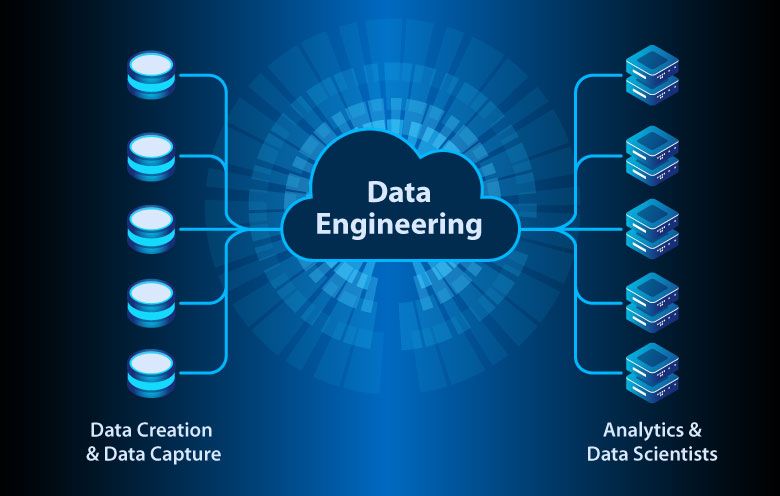Every piece of information is data; and since we are surrounded by information from everywhere, we can say that we live in a pool of data that is growing every minute. Managing such humongous data is not an easy task. Segregating and analyzing it is a challenge of another level.
The importance of data has increased due to its exponential growth in the past few years. This is because more companies understand the importance of data and its ability to augment business growth.
Every organization generates tons of data daily and over time. Due to the ever-growing aspect of data; it has become complicated to handle efficiently. Data analysis is imperative to derive useful insights and make effective business decisions.
This is where data engineering comes into the picture. Data engineering focuses on practical applications of data collection and analysis. Data engineers develop systems that accumulate, handle and transform raw data into usable information. Data scientists and business analysts make use of this refined information to make useful interpretations. Their ultimate goal is to make data accessible so that organizations can leverage it to evaluate and optimize their performance.
A proper big data strategy simplifies operational expenses, minimizes time to market and creates room for more innovation. But organizations face a lot of challenges in handling data and find it difficult to execute the plan into action. Companies have several applications and systems that capture and collect data, but they still struggle to figure out which data is useful and how to make use of it effectively.
Data engineering consulting can help companies in building physical infrastructure for collecting data from different sources amid discrete applications. It also helps in storing, cleaning and moving data throughout the organizational structure. There are several other aspects like performance, scalability, timeliness, security and data governance that they have to maintain while defining a data strategy for an organization.
Key data challenges and how to solve them
1. Managing huge volumes of data
Organizational data is growing every day as companies extract this data from their CRM and ERP systems as well as other data sources daily. Big data not only involves huge volumes of data stored in different systems and platforms but also deals with the variety and velocity of data. Since these data sets are very large, consolidating them is an exceptionally challenging task.
With disparate data sources, it is obvious that collected data contains a variety of data sets. This is an overwhelming factor for data engineers that makes it crucial to make data easily accessible for brand managers.
Moreover, the enormous growth in data has led to a situation where it has become difficult to store these huge sets of information appropriately. The volume of information being stored in data centers and databases of organizations is increasing at a high pace every day. And since most of the data sets are unstructured, being collected from documents, Excel files and other sources; it becomes more difficult to search them in the data pool.
Solution:
The data that your organization generates is raw and unstructured. Since you are using that data for insights, you are aware of its significance for market intelligence. So, to gain optimum advantages of raw data, you must consider replacing data silos with a scalable data hub.
When you integrate unstructured data collected from different sources and combine it with artificial intelligence, the analysis obtained gives you the intelligence required to make savvy business decisions.
Data engineering helps you with proper systems of storing, analyzing, and reporting data from a broad range of sources. You can share it with your decision-makers to realize the value connected with unstructured data.
Organizations must integrate modern techniques to manage large data sets. Techniques like compression, tiering and deduplication reduce the overall size of data and minimize space consumption and storage costs. Apart from this, big data tools like Hadoop, NoSQL databases, Spark, AI, ML, BI applications, etc. enable companies to accumulate data efficiently. Also,the data warehouse, ETL and data lake help in handling data growth and storage.
The volume of data/information created, captured, copied and consumed worldwide from 2010 to 2025

Source: https://www.statista.com
2. Lack of proper understanding of enormous data
Overwhelmed with the continuously generating data, companies tend to fail in their big data initiatives. One reason for this is the lack of understanding. Since data engineering is not a conventional approach, employees are mostly unaware of data handling, its storage, processing, significance and sources. Such unawareness leads to the loss of sensitive data because of no backup. Employees may not understand how to use databases appropriately for storage. This may lead to loss of data, making it difficult to be retrieved. Data engineers on the other hand have a better understanding of what is happening and how.
Solution:
Spreading awareness is the key to this problem. Companies must arrange for big data workshops and seminars for their employees. The workforce responsible for data handling must be given proper training. The rest of the teams must have a basic understanding of general data handling concepts.
3. Integrating data from disparate sources
Every organization generates and collects data for their different departments from disparate sources like Excel files, social media, ERP, CRM, customer logs, financial reports, e-mails, presentations and numerous kinds of reports that their employees create daily. Such a huge variety and volume of data is not only difficult to combine but it is also complicated to segregate and analyze. But data integration is very important for analysis, reporting and business intelligence which organizations must be careful about.
Solution:
To solve the challenges of data integration, you must integrate a proper tool. A few tools that you can choose from are:
- Azure and AWS
- Talend Data Integration
- Centerprise Data Integrator
- Informatica PowerCenter
- Microsoft SQL QlikView
4. Confusion in choosing the right big data tool
There are several tools available for data analysis and storage. Companies have to choose tools and technologies as per their business requirements. But lack of awareness about the data engineering domain often results in the wrong selection of tools and technologies.
Solution:
As mentioned above, a wide range of big data technologies is available with some common features and capabilities. Companies must consider the organization’s current and future requirements for data from streaming to batch sources while choosing the technologies. For example, Power BI and Tableau can be used for data analytics and visualization and Informatica can be used for ETL and master data management.
5. Securing data
Data security is one of the major concerns for organizations. Companies focus more on understanding, storing and analyzing their data sets, but they often neglect the security aspect and push it to later stages, leaving data unprotected. This can be harmful as unprotected data warehouses are susceptible to data breach, hacking and other malicious activities.
Solution:
To avoid the hassles and rework, you should hire data scientists with expertise in the domain. With years of experience in handling, managing and securing data, data engineers can guide you better in choosing the best tools and technologies.
Hiring cybersecurity professionals can help you guard your organizational data. You can also opt for data encryption and segregation, identity and access authorization control, implementation of endpoint security, real-time security monitoring, etc. You can also use big data security tools, like IBM Guardian.
Summarizing it up!
Management of data is one of the most important steps when you want to transform your organization into a data-centric enterprise. This helps you to scaleup your business and empowers you with data security, compliance and privacy. To keep up with the current market scenarios and large volumes of data generated every day, data management is the key. This will help you make informed decisions and take your business to a higher level of success.
There are challenges that you may face if you decide to take up this journey by yourself. Therefore, you should hire data engineers and use their data engineering consulting services. To know more about how data engineering will help you expand your business, connect with our data analysis specialists.









